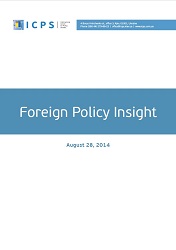
Foreign Policy Insight, Issue 2014 - 01 Responding to the Russians
Meeting in Minsk // Merkel’s visit to Ukraine
More...We kindly inform you that, as long as the subject affiliation of our 300.000+ articles is in progress, you might get unsufficient or no results on your third level or second level search. In this case, please broaden your search criteria.

Meeting in Minsk // Merkel’s visit to Ukraine
More...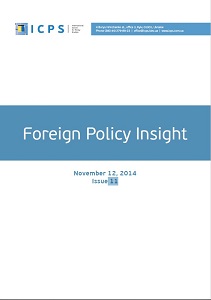
Turkey: a friend, a partner, a competitor?
More...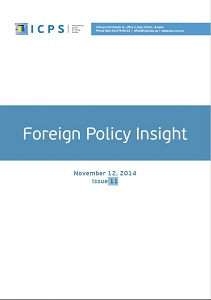
Ukraine and Belarus: attempts to elaborate common positions against a backdrop of the Russian-Ukrainian conflict
More...
Ukrainian-Polish affairs: challenges and opportunities
More...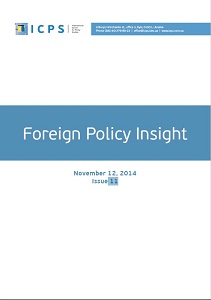
Ukraine-EU Summit: What will save European integration of Ukrane?
More...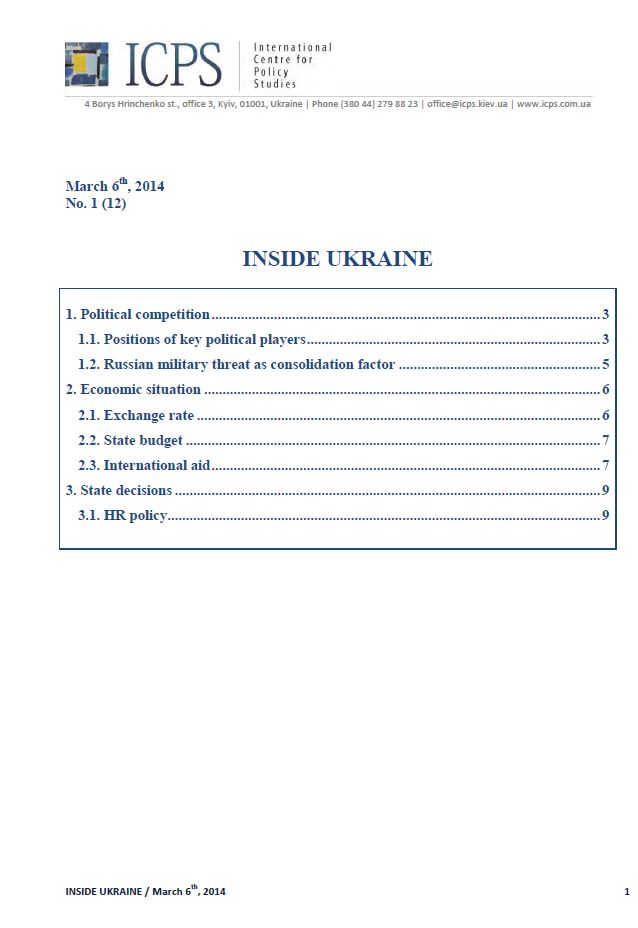
1. Political competition // 1.1. Positions of key political players // 1.2. Russian military threat as consolidation factor // 2. Economic situation // 2.1. Exchange rate // 2.2. State budget // 2.3. International aid // 3. State decisions // 3.1. HR policy
More...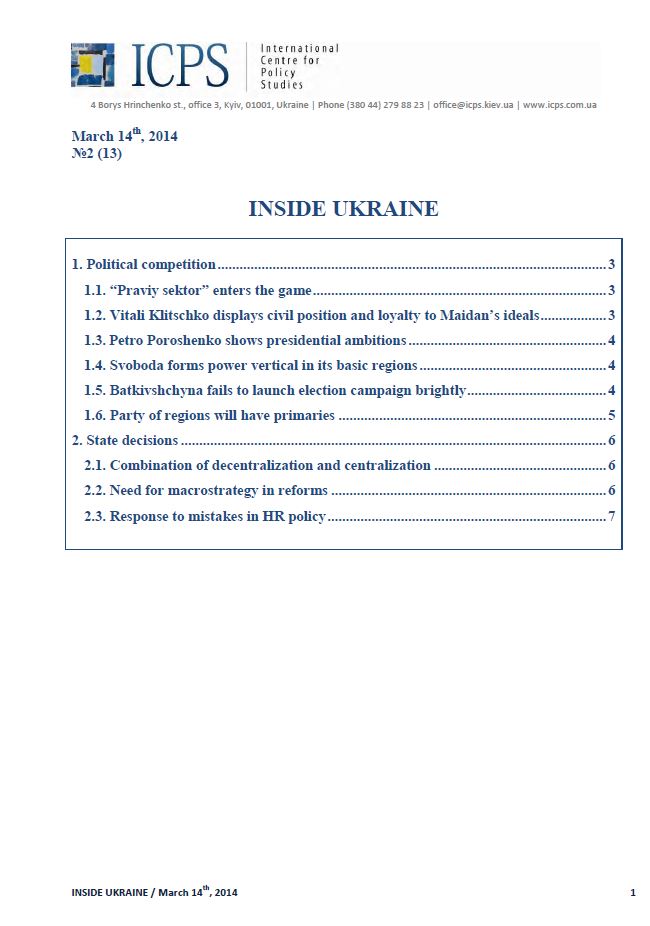
1. Political competition // 1.1. “Praviy sektor” enters the game // 1.2. Vitali Klitschko displays civil position and loyalty to Maidan’s ideals // 1.3. Petro Poroshenko shows presidential ambitions // 1.4. Svoboda forms power vertical in its basic regions // 1.5. Batkivshchyna fails to launch election campaign brightly // 1.6. Party of regions will have primaries // 2. State decisions // 2.1. Combination of decentralization and centralization // 2.2. Need for macrostrategy in reforms // 2.3. Response to mistakes in HR policy
More...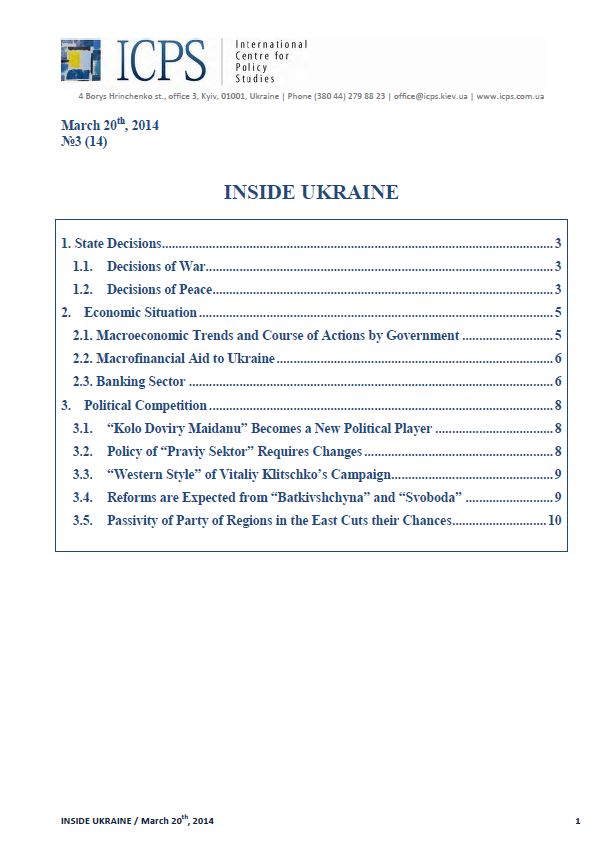
1. State Decisions // 1.1. Decisions of War // 1.2. Decisions of Peace // 2. Economic Situation // 2.1. Macroeconomic Trends and Course of Actions by Government // 2.2. Macrofinancial Aid to Ukraine // 2.3. Banking Sector // 3. Political Competition // 3.1. “Kolo Doviry Maidanu” Becomes a New Political Player // 3.2. Policy of “Praviy Sektor” Requires Changes // 3.3. “Western Style” of Vitaliy Klitschko’s Campaign // 3.4. Reforms are Expected from “Batkivshchyna” and “Svoboda” // 3.5. Passivity of Party of Regions in the East Cuts their Chances
More...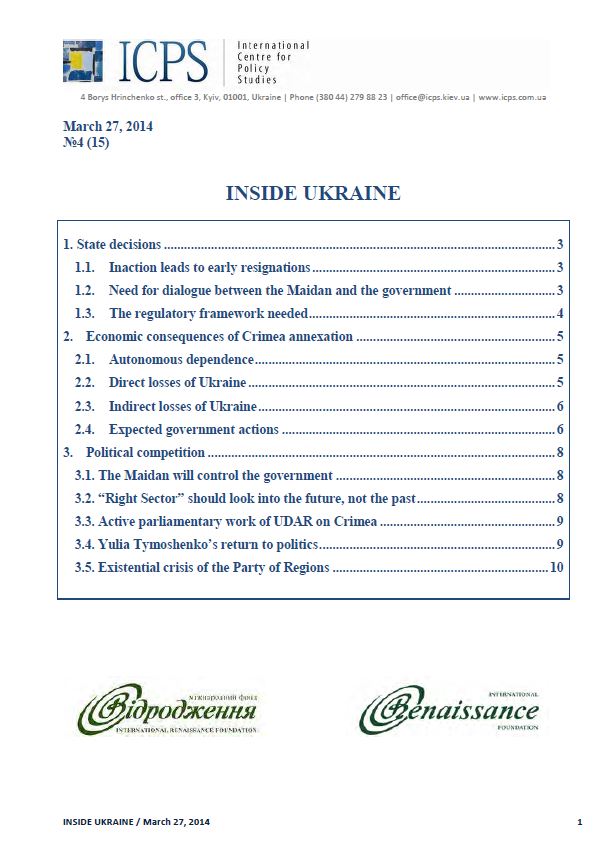
1. State decisions // 1.1. Inaction leads to early resignations // 1.2. Need for dialogue between the Maidan and the government // 1.3. The regulatory framework needed // 2. Economic consequences of Crimea annexation // 2.1. Autonomous dependence // 2.2. Direct losses of Ukraine // 2.3. Indirect losses of Ukraine // 2.4. Expected government actions // 3. Political competition // 3.1. The Maidan will control the government // 3.2. “Right Sector” should look into the future, not the past // 3.3. Active parliamentary work of UDAR on Crimea // 3.4. Yulia Tymoshenko’s return to politics // 3.5. Existential crisis of the Party of Regions
More...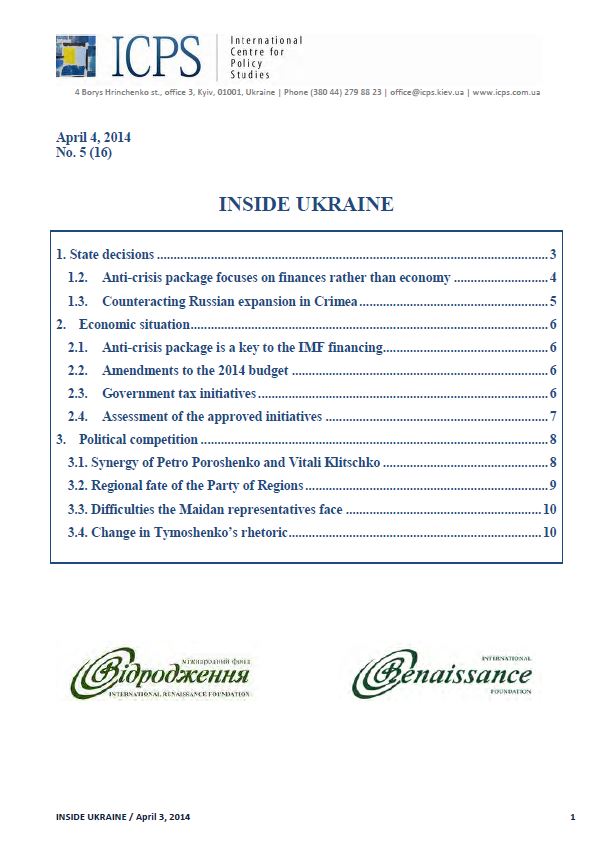
1. State decisions // 1.2. Anti-crisis package focuses on finances rather than economy // 1.3. Counteracting Russian expansion in Crimea // 2. Economic situation // 2.1. Anti-crisis package is a key to the IMF financing // 2.2. Amendments to the 2014 budget // 2.3. Government tax initiatives // 2.4. Assessment of the approved initiatives // 3. Political competition // 3.1. Synergy of Petro Poroshenko and Vitali Klitschko // 3.2. Regional fate of the Party of Regions // 3.3. Difficulties the Maidan representatives face // 3.4. Change in Tymoshenko’s rhetoric
More...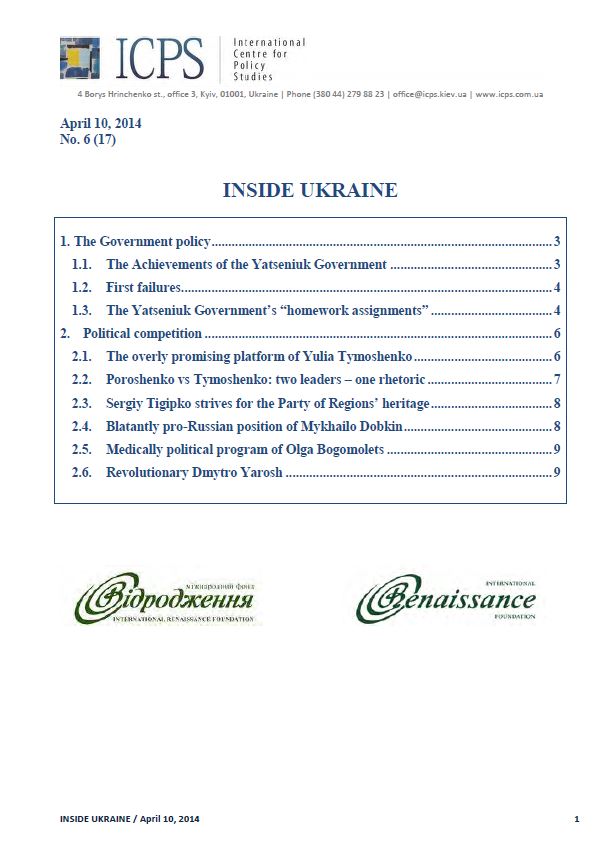
1. The Government policy // 1.1. The Achievements of the Yatseniuk Government // 1.2. First failures // 1.3. The Yatseniuk Government’s “homework assignments” // 2. Political competition // 2.1. The overly promising platform of Yulia Tymoshenko // 2.2. Poroshenko vs Tymoshenko: two leaders – one rhetoric // 2.3. Sergiy Tigipko strives for the Party of Regions’ heritage // 2.4. Blatantly pro-Russian position of Mykhailo Dobkin // 2.5. Medically political program of Olga Bogomolets // 2.6. Revolutionary Dmytro Yarosh
More...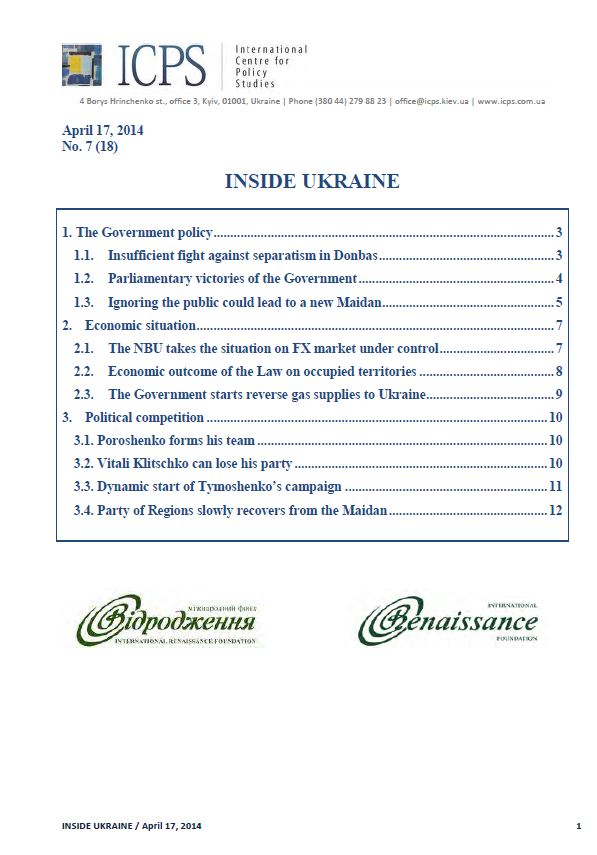
1. The Government policy // 1.1. Insufficient fight against separatism in Donbas // 1.2. Parliamentary victories of the Government // 1.3. Ignoring the public could lead to a new Maidan // 2. Economic situation // 2.1. The NBU takes the situation on FX market under control // 2.2. Economic outcome of the Law on occupied territories // 2.3. The Government starts reverse gas supplies to Ukraine // 3. Political competition // 3.1. Poroshenko forms his team // 3.2. Vitali Klitschko can lose his party // 3.3. Dynamic start of Tymoshenko’s campaign // 3.4. Party of Regions slowly recovers from the Maidan
More...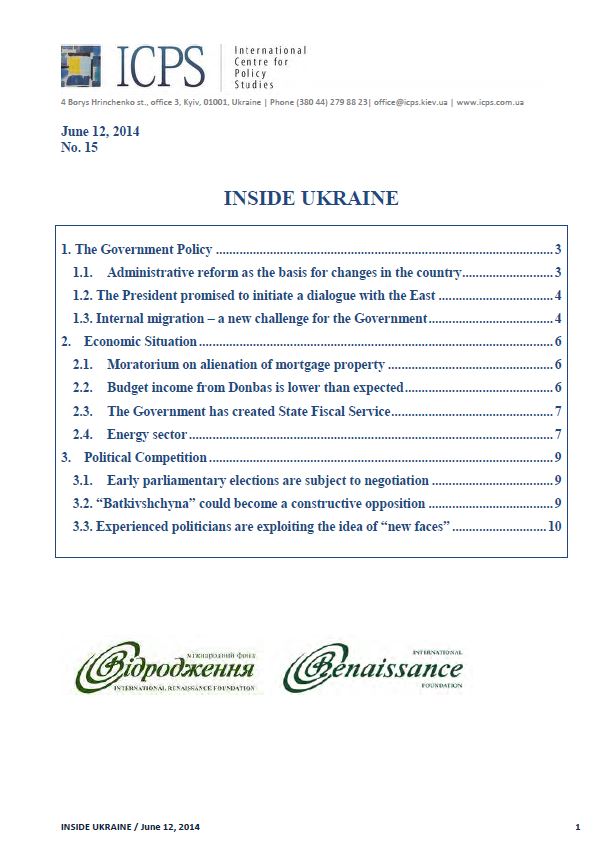
1. The Government Policy // 1.1. Administrative reform as the basis for changes in the country // 1.2. The President promised to initiate a dialogue with the East // 1.3. Internal migration – a new challenge for the Government // 2. Economic Situation // 2.1. Moratorium on alienation of mortgage property // 2.2. Budget income from Donbas is lower than expected // 2.3. The Government has created State Fiscal Service // 2.4. Energy sector // 3. Political Competition // 3.1. Early parliamentary elections are subject to negotiation // 3.2. “Batkivshchyna” could become a constructive opposition // 3.3. Experienced politicians are exploiting the idea of “new faces”
More...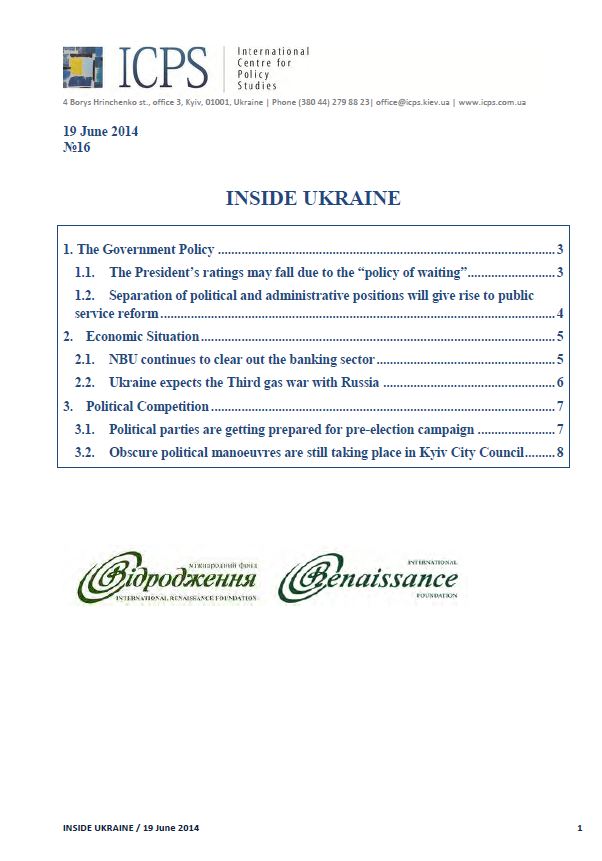
1. The Government Policy // 1.1. The President’s ratings may fall due to the “policy of waiting” // 1.2. Separation of political and administrative positions will give rise to public service reform // 2. Economic Situation // 2.1. NBU continues to clear out the banking sector // 2.2. Ukraine expects the Third gas war with Russia // 3. Political Competition // 3.1. Political parties are getting prepared for pre-election campaign // 3.2. Obscure political manoeuvres are still taking place in Kyiv City Council
More...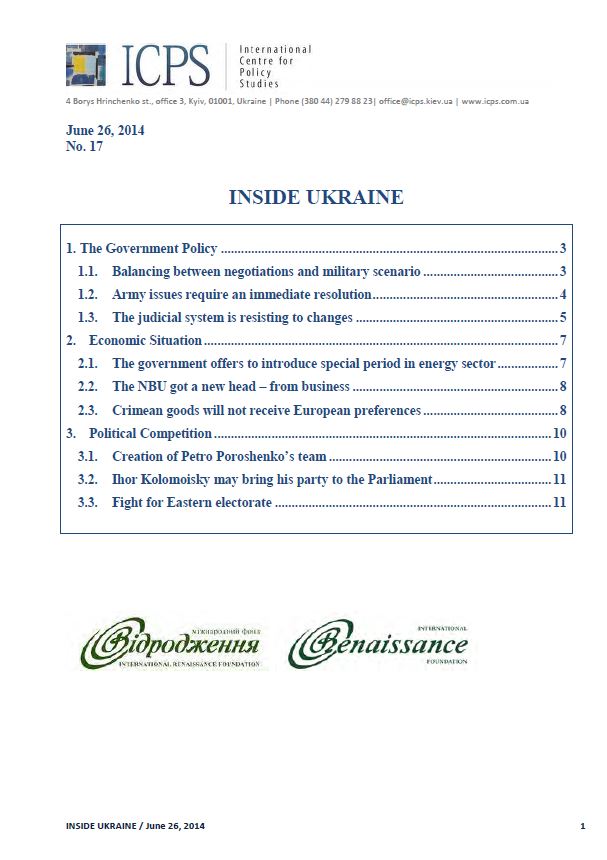
1. The Government Policy // 1.1. Balancing between negotiations and military scenario // 1.2. Army issues require an immediate resolution // 1.3. The judicial system is resisting to changes // 2. Economic Situation // 2.1. The government offers to introduce special period in energy sector // 2.2. The NBU got a new head – from business // 2.3. Crimean goods will not receive European preferences // 3. Political Competition // 3.1. Creation of Petro Poroshenko’s team // 3.2. Ihor Kolomoisky may bring his party to the Parliament // 3.3. Fight for Eastern electorate
More...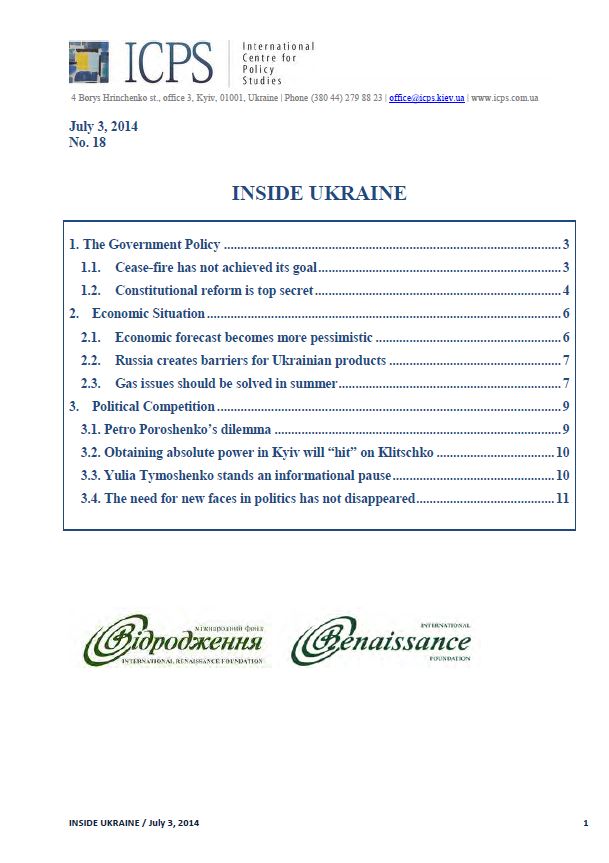
1. The Government Policy // 1.1. Cease-fire has not achieved its goal // 1.2. Constitutional reform is top secret // 2. Economic Situation // 2.1. Economic forecast becomes more pessimistic // 2.2. Russia creates barriers for Ukrainian products // 2.3. Gas issues should be solved in summer // 3. Political Competition // 3.1. Petro Poroshenko’s dilemma // 3.2. Obtaining absolute power in Kyiv will “hit” on Klitschko // 3.3. Yulia Tymoshenko stands an informational pause // 3.4. The need for new faces in politics has not disappeared
More...
Through FORA project we have implemented several interactive activities with migrants, refugees and local population in Serbia, Croatia, Greece in Sweden. Through those interactions we have extracted some of the policy recommendations for decision makers on local, national and European level. In each country the situation related to integration is different. This is why we have left to each participating organization to create its own recommendation priorities and use its own stile of presentation. We hope that our recommendations will be heard and implemented by relevant decision makers and make Europe more open towards the newcomers.
More...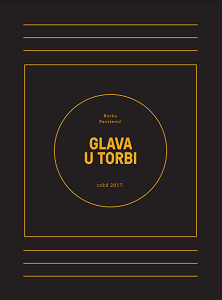
„Glava u torbi“ zajednički je imenitelj, nadnaslov, kolumni koje sam objavljivala u vikend izdanju lista „Danas“ svake nedelje od maja 2013. godine do decembra 2016. godine. Do tada sam u „Danasu“ pisala kolumne sredom, od početka izlaženja lista, pod naslovom „Postdejtonska moda“, a posle 5. oktobra 2000. godine i pod naslovom „No Longer and Not Yet“ (Hana Arent). I bile su kraće. A onda me je uredništvo „Danasa“ bez naročitog upozorenja prebacilo na čitavu stranu nedeljnog dodatka. Nadam se da između „Postdejtonske mode“, „Not Longer and Not Yet“ i „Glave u torbi“ postoji određeni kontinuitet. Sudeći po materijalu koji stvarnost nudi možda će Glava u torbi potrajati još desetak godina, kada list „Danas“ kome je dvadesetogodišnjica, bude obeležavao trideset godina i ja zajedno sa njim. Nigde danas „Danasa“ na kioscima – „Razgrabljen!“ kaže prodavac na „mom kiosku“ koji inače po instrukcijama pakuje „Danas“ negde ispod Sportskog žurnala. U znak solidarnosti čitaoci kupuju Danas koji je ugrožen združenim snagama režima. Mladi ljudi u protestu „Protiv diktature“, i svi ljudi u protestu, podržavaju i nose Danas, uzdižu ga iznad glave i torbe. Tamo gde se osvaja sloboda, uprkos svim „skretanjima“ „Danas“ je na pravom putu, putu slobode, protiv cenzure i ucene svake vrste. Drago mi je što sam danas deo „Danasa“, za danas i za budućnost. Izvinjavam se prodavcu u samoposluzi što ne znam šta hoću, a on kaže – „Možete da me davite koliko hoćete, čitam vaše kolumne i slažem se“. Strogi prijatelji su me potakli da objavim „Glavu u torbi“, uverili me da je to obaveza zbog razumevanja vremena u kome smo bivali i akteri i svedoci. Da se time potakne pamćenje protiv zaborava događaja i ličnosti, ili celine, pojma o celini, i današnju preku potrebu da se razume, a time i menja stvarnost. Dakle, evo mog udela u toj celini.
More...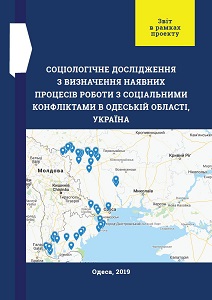
All four outcomes of the project, namely – to analyze existing processes of managing social conflicts in Odesa region, to define the local needs and requests for intervention with social conflicts in communities, to identify local initiatives, groups, CSOs, institutions, individual activists and enthusiasts who are working with social conflicts at the community level and to define the competencies, knowledge, experience and capacities of local actors dealing with social conflicts have been reached by conducting focus groups and in-deep interviews, analyzing their results and correlating with media analysis. A final presentation and a workshop allowed checking the findings’ results and to discuss better the issue of needed competencies, as not always local communities’ representatives could identify them by themselves as not being aware of their existence or possible use. For the first time in Odessa region such a comprehensive study has been implemented. During the last 5 years, several studies, including those done by our organization, were done for south of the region (Bessarabia), as the region has two risk factors: multiethnicity and border positioning. However, nobody tried to see a picture wider, to look to other districts of Odessa region, where reforms and transformations happening, where some of them also are border districts or have their own historical particularities. Such a report will allow other organizations and stakeholders to see better local developments and their perceptions, to evaluate local needs. The results can be used both for other organizations entering with their projects to local communities, proposing grants, trainings, joint projects, but also during the next local elections, when politicians will be able to address some issues or to pay attention to those conflicts that can sharpen during elections.
More...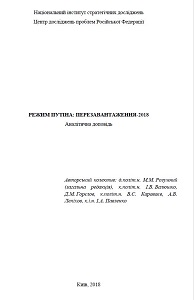
The end of 2017 - the beginning of 2018 passed quite predictably for Russia. The preparation for the presidential elections left a minimum of space for experiments and innovations in domestic and foreign policy. The regime quite consciously implemented an inertial scenario of preserving power, along the way only taking measures to avoid dangers and risks of destabilization. It can be said that during this period, the main security mechanisms were refined and established, thanks to which the current level of control of the situation in the country by the Kremlin was previously achieved and will continue to be maintained.
More...